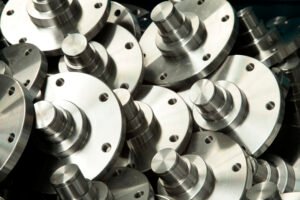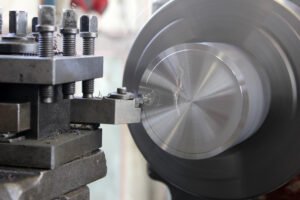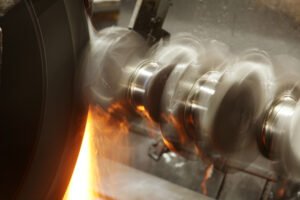CNC Turning Services
CNC turning is a highly precise and efficient subtractive machining process, perfectly suited for creating radially symmetrical parts. This method involves the rotation of the workpiece on a lathe while a cutting tool executes linear motion, allowing for the crafting of complex external shapes and internal bores with exceptional accuracy.
The cornerstone of CNC turning is the sophisticated software that controls the lathe, ensuring remarkable accuracy and repeatability throughout the production cycle. This precision is essential for sectors such as automotive, aerospace, and general engineering, where consistency and adherence to strict tolerances are critical.
Our services in CNC turning feature the latest in machinery technology, capable of accommodating a diverse array of materials and part sizes. This versatility ensures that we are equipped for both large-scale manufacturing projects and smaller, specialized jobs. Whether it’s a unique prototype or a series of high-volume production, our approach guarantees that each part meets the highest standards of quality and precision.
Production Flexibility: CNC turning can adapt to a variety of materials, including different metals and plastics, making it a versatile choice for numerous applications. Our machinery’s adaptability, coupled with our expertise, enables the efficient production of parts with varying specifications.
Stringent Quality Control: Rigorous inspection is a staple in our CNC turning process. Utilizing advanced measuring tools, we ensure that every component strictly aligns with client specifications and industry benchmarks.
Customization and Intricate Designs: Our CNC turning capabilities are ideal for projects demanding high customization and intricate detailing, making it a preferred method for bespoke and complex designs.
Efficient Project Turnaround: CNV Engineering is committed to providing efficient turnaround times. Our optimized processes and skilled team ensure that your projects are completed promptly, maintaining our dedication to quality.
Gallery




What is CNC Turning ?
CNC turning is a specialized manufacturing process ideal for creating radially symmetrical parts, such as shafts, where precision and symmetry are paramount. The term CNC stands for Computer Numerical Control, which highlights the automated nature of the process, governed by instructions derived from CAD (Computer-Aided Design) files.
In the CNC turning process, the workpiece is mounted on a rotating spindle in the CNC lathe. As the workpiece spins, a cutting tool is brought into contact with it. This interaction between the cutting tool and the spinning workpiece precisely removes material, forming the part into its desired shape. This method is especially efficient for producing components like shafts, where uniformity around an axis is crucial.
One of the key strengths of CNC turning lies in its ability to produce parts with high accuracy and excellent surface finish. It’s an indispensable process in industries that require high-precision components, such as aerospace, automotive, and general engineering. The CNC turning process is also valued for its repeatability, ensuring that each part produced is consistent with the last, making it ideal for both one-off projects and high-volume production.
What is the CNC Lathing Process ?
The CNC Lathing Process at CNV Engineering utilizes advanced machinery to achieve precision and efficiency in machining radially symmetrical parts. A standard CNC lathe typically operates on two axes: X and Z. This configuration allows the fixed cutting tools to move along the side of the part and in a linear path towards or away from it, essential for the lathing process.
However, the realm of CNC turning has evolved with more sophisticated machines that incorporate additional axes. For instance, the introduction of a Y-axis enables the lathe to perform complex operations like machining holes, keyways, and other features off the centerline of the component, significantly expanding the range of possible part geometries.
CNC lathes are versatile in their capabilities, handling a variety of operations including, but not limited to, lathing, drilling, boring, and threading. This versatility is further enhanced in modern CNC turning centers that combine both CNC milling and turning capabilities. The inclusion of milling machinery adds another dimension of capability, allowing for the creation of intricate parts with complex geometries and details.
These modern CNC machining centers are designed to guarantee tight tolerances and high repeatability. This ensures that each precision machined part is consistently identical, a critical factor in industries requiring high levels of precision and uniformity. Moreover, the advanced technology enables rapid turnaround times, meeting the demands of projects with tight schedules.
Contact
+91- 90035 99554
sales@cnve.in
Schedule a Call
